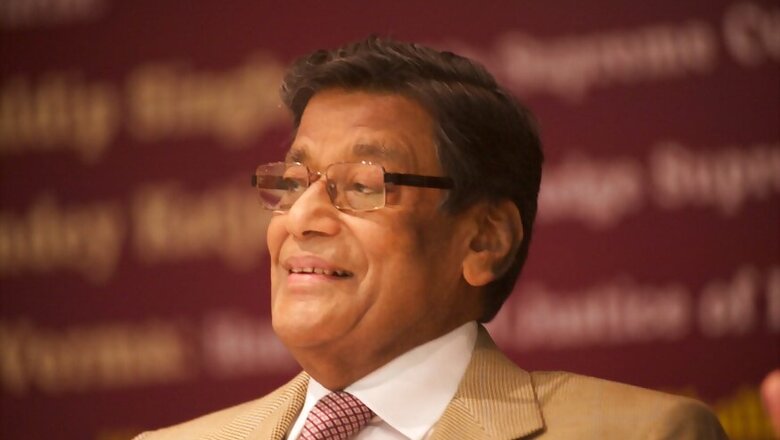
views
New Delhi: Attorney General K K Venugopal on Friday opposed the plea of former law minister Shanti Bhushan to strip the Chief Justice of India (CJI) of the exclusive power to allocate cases, telling the Supreme Court that any attempt to delegate it to other judges would lead to "chaos".
Stressing the need for "unity" among the judges of the top court, he said that Bhushan's plea to vest the power to allocate cases to the five-member Collegium could lead to "conflict" among judges on who would hear which matter and multiplicity of authorities.
The differences among Supreme Court judges over allocation of cases had surfaced at the January 12 presser by four senior most judges who had raised the issue and it entered the courtroom with the filing of Bhushan's plea challenging the CJI's power as the 'master of the roster'.
The AG told a bench of Justices AK Sikri and Ashok Bhushan that the composition of benches and allocation of cases in the apex court was not an exercise which could be taken up by multiple persons and if one person has to decide it, then it has to be the CJI.
If collegium or the full court is vested with this power, it "would be an unending exercise which may also result in unity of judges being not there. Unity of judges for dispensation of justice in the highest court is needed," Venugopal, who was earlier asked by the bench to assist in the matter, said.
"It is essential that there should be one person doing this and if it has to be one person, then it has to be the CJI," he told the bench which reserved its order on the plea that has challenged the existing roster practice of allocation of cases by the CJI.
Maintaining that the issue of allocation related to internal functioning of the Supreme Court, he said if the collegium or the full court was vested with this power, there might be a "conflict" among judges as to who would hear which matter.
"According to me, it would lead to a chaos if there is multiplicity of judges involved in it", the Attorney General said and referred to a 2010 judgement of the apex court which had held that the CJI would decide on constitution of benches and which judge should hear which matter.
Referring to another verdict, he argued that it was said in the judgement that if the judges were free to choose cases whatever they wanted to hear, the machinery of the court would collapse.
Venugopal said the exercise of roster and allocation of cases was different from the process of selection of judges for the higher judiciary by the apex court collegium. "In case of appointment of judges, they (collegium) decide as to who should be selected for elevation. They (members of collegium) are not personally involved. But, here it is personal involvement," he said, adding "the CJI has a very onerous problem in making these decisions".
During the hearing, senior counsel Dushyant Dave and advocate Prashant Bhushan, appearing for the petitioner, questioned the manner in which some "sensitive cases" were allocated to particular benches in the court in contravention of the rules.
Referring to the CJI being the "master of roster", Dave asked "does this give power to the CJI to fix roster and direct listing of matter before particular benches?".
He referred to constitutional provisions and the Supreme Court Rules and said that there was "ambiguity" in the rules as to whether the CJI possesses power to frame roster.
To this, the bench asked, "suppose the CJI has no such powers, then how will this court function". Dave said the Constitution framers had given the power to all judges of the Supreme Court to decide how the top court of the country would function. "Your lordships can sit together every year or every term of the year to decide how the roster should be and how matters should be allocated," he said, adding that the constitution of benches and fixing of the roster "is extremely sensitive today".
He also said the petition and its prayer was to strengthen the court and was not directed against any individual. There should not be any "human intervention" in allocation of cases and matters should be allocated automatically through computers to the concerned court as per roster.
"It is not that the CJI has unbridled power," he said, adding that if a system of rule was put in place, it should be followed and a transparent procedure should be there.
When he raised the issue of listing of PILs before the CJI, the bench observed that even in high courts, PILs were listed before the chief justice and in many high courts, PILs were also listed before court number two.
"There is no hard and fast rule (for listing of PILs)," Justice Sikri observed. At the fag end of hearing, Venugopal raised objection on the alleged aspersions cast on some judges in the PIL and termed it as "very wrong".
In his PIL, Shanti Bhushan has stated that the "master of roster" cannot be an "unguided and unbridled" discretionary power, exercised arbitrarily by the CJI by hand-picking benches of select judges or by assigning cases to particular judges.
The petition assumes significance in light of the January 12 press conference where four senior most judges of the top court - Justices J Chelameswar, Ranjan Gogoi, Madan B Lokur and Kurian Joseph - had said that situation in the top court was "not in order" and many "less than desirable" things have taken place.




















Comments
0 comment